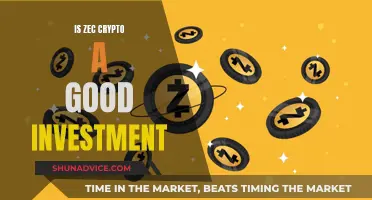
Investing in cryptocurrency in India comes with a unique set of considerations. Despite the growing popularity of cryptocurrencies like Bitcoin and Ethereum in the country, there are several risks and uncertainties associated with the virtual coin market that investors should be aware of. One of the biggest concerns is the lack of regulation and a clear government stance on cryptocurrency. While investing in cryptocurrencies is legal in India, there are no rules or guidelines in place to protect investors in case of disputes. Additionally, the highly volatile nature of the cryptocurrency market, the possibility of a ban, and the absence of sovereign guarantees make it a risky investment option. However, for investors with a high-risk appetite and a long-term investment horizon, the potential rewards of the crypto market may outweigh these risks.
| Characteristics | Values |
|---|---|
| Safety | Cryptocurrency is a risky investment due to its volatility and lack of regulation. |
| Regulation | Cryptocurrency is not regulated by any central authority in India. |
| Legality | Cryptocurrency is not illegal in India, but it is not approved by the government. |
| Taxation | The Indian government has imposed a 30% tax and 1% TDS on gains from cryptocurrencies. |
| Advantages | Cryptocurrency offers protection against inflation, cost-effective transactions, and portfolio diversification. |
| Disadvantages | Cryptocurrency is subject to interference from federal authorities, 51% attacks, and excessive power consumption. |
| Exchanges | Popular crypto exchanges in India include CoinDCX, ZebPay, and CoinSwitch Kuber. |
What You'll Learn

Regulatory hurdles and the possibility of a ban
The biggest risk involved in cryptocurrency trade in India is the lack of regulation and oversight. The government has not been able to take a concrete stand on cryptocurrency, which has resulted in the lack of regulation. This problem dates back to 2018 when the Reserve Bank of India (RBI) attempted to impose a blanket ban on such trade. The RBI had issued a circular cautioning users, holders, and traders of virtual currencies about the risks associated with dealing in them. The circular had advised all entities regulated by the RBI to not deal in virtual currencies or facilitate their use for purchases.
While the Supreme Court overturned the RBI circular on March 4, 2020, banks remained hesitant to deal with cryptocurrencies. It is only recently that the RBI clarified its stance, after which banks have started dealing more liberally with cryptocurrency exchanges.
Another issue that poses a risk to crypto trade in India is the possibility of a ban. Although the government has softened its stance recently, it is still unclear whether it will go for a complete ban or regulation. In case of a complete ban on decentralised virtual coins, investors in India could face heavy losses. However, experts familiar with virtual currencies and analysts feel that regulating crypto trade would be a better option, considering that it is emerging as the next big asset of the financial world.
The lack of regulatory protection discourages many keen investors from investing in cryptocurrencies. Cryptocurrencies also face other risks, including exposure to hacking, permanent loss in case of a forgotten password, malware attacks, and scams.
A Beginner's Guide to Investing in Bitcoin
You may want to see also

The volatile nature of the cryptocurrency market
Supply and demand play a significant role in the volatile price history of Bitcoin and other cryptocurrencies. As a limited number of coins are in circulation, the market value is heavily influenced by how many people are willing to buy or sell them. Media outlets, influencers, and industry figures can also create investor concerns or hype, leading to price fluctuations. For example, Elon Musk's tweets have significantly impacted Bitcoin's value, showcasing the power of individual opinions in influencing investment risks.
Investor actions and sentiments are another critical factor in cryptocurrency volatility. Fear of missing out on big price movements or falling victim to downswings can lead to panic selling or buying, affecting demand and prices. Additionally, the varying belief in the utility of cryptocurrencies as a store of value or a method of value transfer contributes to volatility. Some investors view cryptocurrencies as a hedge against inflation and an alternative to traditional investments like gold.
The regulatory landscape surrounding cryptocurrencies also impacts their volatile nature. Changes in government policies and tax regulations can cause uncertainty and influence market prices. For instance, China's ban on cryptocurrency transactions in 2021 significantly affected Bitcoin's value as miners were forced to relocate.
Lastly, the relatively young age of cryptocurrencies compared to traditional assets like gold or fiat currencies contributes to their volatile nature. Cryptocurrencies are still in the price discovery phase, and their values will likely continue to fluctuate as investors, users, and governments navigate the initial growing pains and concerns.
In summary, the volatile nature of the cryptocurrency market stems from a combination of factors, including supply and demand dynamics, investor sentiments, media influence, regulatory changes, and the emerging status of cryptocurrencies as an investment asset. Investors should carefully consider these factors and their risk appetite before deciding to invest in cryptocurrencies.
The Ultimate Guide to Investing in PEAQ Crypto
You may want to see also

The lack of a central authority
Investing in cryptocurrencies in India is a complex issue. While it is legal in the country, and there is a growing popularity, there are still many risks involved. One of the biggest risks is the lack of a central authority or regulation. This is a unique feature of cryptocurrencies like Bitcoin, which are decentralised.
Decentralisation means that the cryptocurrency is not issued by a central bank and is not controlled by a central, authoritative location or group. Instead, it is produced, used, and managed by the users who belong to its network. The value of the currency is determined by the economic forces of demand and supply, as well as the network activity of its users. This means that power and control are distributed across the network, rather than being concentrated in a single authority.
On the other hand, the lack of a central authority can also be seen as a drawback. Without a central bank, there is no trusted authority to backstop the currency and ensure its stability. This can lead to increased volatility and risk, as there is no central decision-making body to manage the supply of money and interest rates. Additionally, the lack of regulatory protection can discourage investors, as there is no oversight or protection against potential losses.
The absence of a central authority also has implications for the broader financial system. Cryptocurrencies like Bitcoin have the potential to upend the existing financial infrastructure and undermine the role of governments and central banks. This is because they can be used to circumvent capital controls, facilitate illicit activities, and remove intermediaries from financial transactions. As a result, governments and central banks are watching Bitcoin and other cryptocurrencies warily, and their lack of recognition and regulation reflects this concern.
In summary, the lack of a central authority in cryptocurrencies is a double-edged sword. It offers benefits in terms of removing regulatory influence, but it also comes with increased risks and potential destabilisation of the financial system. This is a key consideration for investors in India, as the lack of regulation and the possibility of a ban on cryptocurrencies pose significant financial risks.
Dogecoin: Worthy Investment or Risky Business?
You may want to see also

The risks of hacking and scams
Scammers often impersonate legitimate businesses, government agencies, or even a love interest to convince unsuspecting victims to hand over their crypto assets. These scams can be initiated through text, email, social media, or even a phone call.
One common scam is the "investment manager" scam, where a scammer pretends to be an investment manager and promises to grow the victim's money if they transfer their cryptocurrency to the scammer's online account. The scammer will often pressure the victim to act quickly and will guarantee high returns. However, once the victim transfers their funds, they will be unable to withdraw them, and the scammer will disappear.
Another scam involves impersonating a celebrity who promises to multiply any cryptocurrency sent to them. Scammers will often use fake social media accounts and QR codes to trick victims into sending them crypto.
Romance scams are also common, where a scammer pretends to be interested in a romantic relationship with the victim and gains their trust. Eventually, they will suggest investing in cryptocurrency together or ask the victim to send them crypto. Once the victim sends funds, the scammer will disappear.
It's important to remember that only scammers will guarantee profits or big returns. Legitimate investment opportunities always carry some level of risk. To avoid scams, it's crucial to do your research and be cautious when sending cryptocurrency to anyone.
How to Get Free Bitcoin Without Investment?
You may want to see also

The high energy consumption of mining coins
While cryptocurrencies like Bitcoin have gained popularity in India, the high energy consumption of mining coins is a significant concern. The process of mining Bitcoin involves solving complex cryptographic puzzles that require significant computational power and energy usage. This energy consumption is not limited to powering the machines performing the computations but also includes the energy needed to cool the equipment to prevent overheating.
The total energy consumption of the Bitcoin network has grown exponentially over the years, and it now consumes more energy than several countries. In fact, if Bitcoin were a country, it would rank among the world's biggest energy-consuming nations. The energy used to mine Bitcoin is primarily sourced from fossil fuels, which contributes to its large carbon footprint. A single Bitcoin transaction could cost as much water as a backyard swimming pool, and the carbon footprint of one Bitcoin transaction is equivalent to the carbon footprint of 852,937 VISA transactions or 64,140 hours of watching YouTube.
The energy-intensive nature of Bitcoin mining has drawn the attention of policymakers and grid planners in various countries, including the United States. The rapid growth in electricity demand associated with cryptocurrency mining has raised concerns about its effects on the electricity grid, potential increases in electricity prices, and carbon dioxide emissions. The North American Electric Reliability Corporation (NERC) has indicated that the potential growth in cryptocurrency mining can significantly impact demand and resource projections, as well as system operations.
While other cryptocurrencies, like Ethereum, use a different process called proof of stake, which requires significantly less computing power and electricity, Bitcoin's energy consumption remains a pressing issue. The high energy consumption of mining Bitcoin and other proof-of-work cryptocurrencies has led to calls for the crypto community to address environmental concerns and reduce the carbon footprint of these digital currencies.
Bitcoin Mining: How Much Should You Invest?
You may want to see also
Frequently asked questions
Like any other investment, cryptocurrency is not risk-free. There are market risks, cybersecurity risks, and regulatory risks. Cryptocurrency is not issued or regulated by any central government authority in India, so investors should be cautious.
The biggest risk is the lack of regulation and oversight. The Indian government has not taken a clear stance on cryptocurrency, and there is a possibility of a ban. Other risks include exposure to hacking, permanent loss due to forgotten passwords, malware attacks, and scams.
Cryptocurrency offers protection against inflation, as it has a limited supply. It also allows for fast and cost-effective transactions, especially for international transfers. Additionally, it provides portfolio diversification and is easy to purchase through crypto exchanges.
Some popular crypto exchanges in India include CoinDCX, ZebPay, Mudrex, WazirX, CoinDCX, Coinswitch Kuber, and Unocoin. These platforms allow users to buy, sell, and monitor the value of cryptocurrencies.







